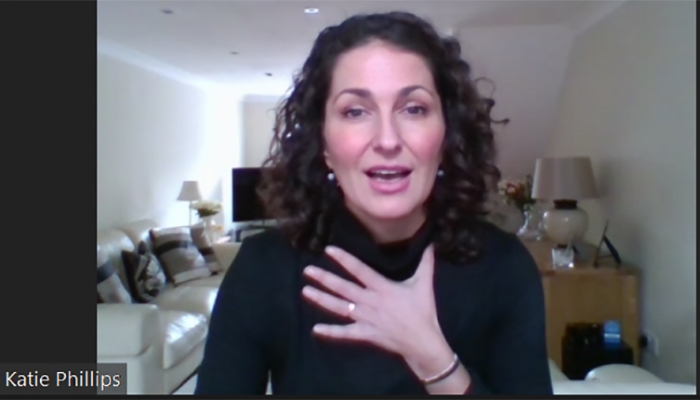accessmatters with KDP Coaching & Consulting’s Katie Phillips
‘There’s never been a better time to talk about mental health in the workplace, but we’ve got a long bloody way to go,’ is how KDP Coaching & Consulting’s Katie Phillips summed up the management of mental health issues in 2021 during today’s accessmatters discussion on wellbeing in the workplace.
In the session, ‘recovering perfectionist’ Katie shared the story of how she became an advocate for mental wellbeing at work as well as advice for those currently struggling. With 15 years of experience in communications, government, corporates and start-ups across the world, Katie’s own burn out and eventual recovery inspired her to launch her own consultancy, helping businesses and individuals nurture mental health with one-to-one workshops and coaching.
‘I’ve seen the good, the bad and the horrendously ugly of workplace wellbeing,’ said Katie. ‘I realised that something had to change and decided I was going to quit my job, sell all my stuff and run off to the jungle to recoup… I don’t recommend this to everyone, though – don’t fret, that’s not the only way to do it’.
Being a habitual overachiever and perfectionist, Katie’s professional life had never been completely healthy, though it was experiences of chaotic, overly-hierarchical and unkind work environments that turned the day-to-day stresses of working in PR into a full-on crisis. It is recognising that difference between the states of stress and burnout that those working during the pandemic need to pay attention to, advises Katie: ‘Stress is very much about feeling too much – too much work, pressure, noise. Burnout is feeling “not enough” – not filled with hope; empty’.
For Katie, the ramping up of stress to burnout meant a constant questioning of her own ability, feelings of resentment, a louder than ever inner critic that followed her outside of work and physical problems – skin complaints, twitching eyelids and nightly episodes of sickness that wouldn’t allow her to sleep. For those who are noticing similar issues with their own wellbeing, what can be done?
‘The main thing I always say is to look for changes in behaviour,’ says Katie. ‘Be self-aware – notice physical, emotional and cognitive changes. Are you getting colds frequently, are you more tearful or irritable than usual? Do you get brain fog? Do things take longer than they normally would? All of us are experiencing some of these things now – everyone reports this stuff to some level. Our brains are flooded with cortisol; we’re always tired.
‘Are you checking your emails all night, working when you’re sick? These behaviours can lead you very quickly to feelings of exhaustion. It’s really important to look for those changes and be aware of them.’
On the company-level, Katie believes more needs to be done to support the mental health of employees – ‘I’m not sure anyone is doing enough. We are making massive progress, but is talking going to fix things? Companies need to create environments where people thrive. The mental health stuff needs to come on top of systemic change. To be enough, we need to think about the foundations of our organisations and the industry itself.’
And for drawing a line between work and life when things are increasingly blurry, Katie believes making the effort to switch off is vital. ‘I wish I had a magic wand for it. You have to do what works for you; we all need different things. Picking up hobbies I used to love when I was little helps – I loved drawing when I was little, so I started doodling again. I really loved to be on my bike, so I bought a bike. Think about things you used to do for fun. I know it’s not the same as going on holiday, but get a colouring book, cook, have a call with your mates or loved ones.’
Just as important as staying connected and talking, is listening – being aware of what your fellow colleagues might be going through and supporting each other: ‘It’s not just talking, it’s the conversations – a dialogue, not just putting out messages,’ says Katie. ‘Classic PR and marketing stuff, really.’
For more from accessmatters, catch up with our previous sessions with Taylor Bennett Foundation’s Melissa Lawrence and Manifest’s Julian Obubo or check out the accessmatters hub.



Leave a Comment